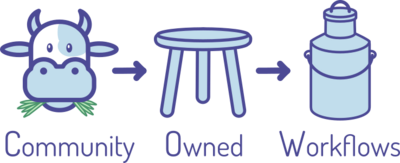Difference between revisions of "Workflow:Community Owned Workflows"
Jump to navigation
Jump to search
Prwheatley (talk | contribs) |
Prwheatley (talk | contribs) |
||
| (14 intermediate revisions by 2 users not shown) | |||
| Line 1: | Line 1: | ||
__NOTOC__ | __NOTOC__ | ||
| − | === | + | ===What is COW?=== |
| − | [[File: | + | [[File:COWLogo Idea.png|right|COW logo|400px]] |
| − | + | Community Owned Workflows (COW) provides a forum for sharing your digital preservation workflows with others in the digipres community. We can learn a lot from each other by sharing our workflows, discussing what tools are used and why, understanding the context behind our workflows, and what challenges and issues they have addressed. So please explore this site, and consider sharing your own workflow! | |
| + | |||
| + | *[[:Category:COW Workflows|Browse COW workflows]] | ||
| + | *[[Contribute your workflow to COW]] | ||
| + | *[[About COW]] | ||
| + | *[[Further information about workflows]] | ||
COW is hosted on the [http://coptr.digipres.org/Main_Page COPTR Wiki], where more information can be found on this site and it's supporters. | COW is hosted on the [http://coptr.digipres.org/Main_Page COPTR Wiki], where more information can be found on this site and it's supporters. | ||
| − | + | {{#ask: | |
| − | [[ | + | [[Category:COW Workflows]] |
| − | + | |mainlabel=Workflow | |
| − | = | + | |?Organisation |
| − | + | }} | |
| − | |||
| − | |||
| − | |||
| − | |||
| − | |||
| − | |||
| − | |||
| − | |||
| − | |||
| − | |||
| − | |||
| − | |||
| − | |||
| − | |||
| − | |||
| − | |||
| − | |||
| − | |||
| − | |||
| − | |||
| − | |||
| − | |||
| − | |||
| − | |||
| − | |||
| − | |||
| − | |||
| − | |||
| − | |||
| − | |||
| − | |||
| − | |||
Latest revision as of 10:46, 28 April 2021
What is COW?
Community Owned Workflows (COW) provides a forum for sharing your digital preservation workflows with others in the digipres community. We can learn a lot from each other by sharing our workflows, discussing what tools are used and why, understanding the context behind our workflows, and what challenges and issues they have addressed. So please explore this site, and consider sharing your own workflow!
COW is hosted on the COPTR Wiki, where more information can be found on this site and it's supporters.
